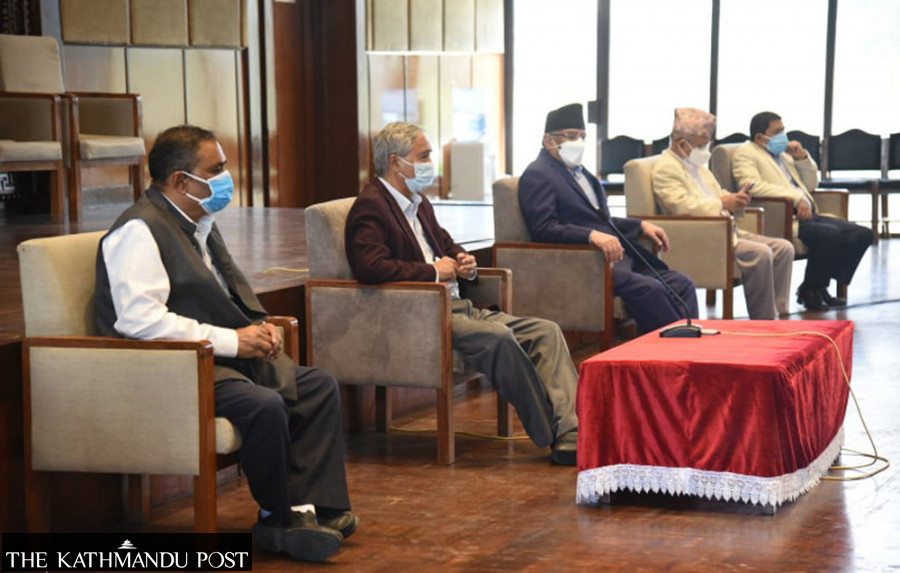Politics
Ruling alliance to consult legal experts amid confusion over timing of three polls
Deuba’s coalition partners say they are considering holding the three tiers of election simultaneously.
Anil Giri & Tika R Pradhan
After Pushpa Kamal Dahal stirred the political pot with a proposal to hold parliamentary elections in April-May by delaying local elections, a meeting of the ruling alliance on Friday decided to consult constitutional and legal experts “to explore ways”.
Leaders said the ruling alliance partners by and large are on the same page when it comes to holding the three tiers of election together—in one go—but since questions have arisen, more discussions are required.
According to leaders who participated in Friday’s meeting of the high-level political coordination committee, ruling party leaders discussed the possibility of holding all three levels of election together but decided to consult experts before reaching a conclusion.
CPN (Unified Socialist) leader Gangalal Tuladhar, who participated in the meeting, said that ruling alliance leaders agreed that there are ambiguities regarding local level elections.
“Our party chair Madhav Nepal also said that the three levels of election should be held simultaneously,” Tuladhar told the Post. “But the leaders were of the view that the ambiguities be cleared before any decision is taken.”
The country needs to hold local, provincial and parliamentary elections by the end of this year.
Nepal held local elections in 2017 in three phases—on May 14, June 28 and September 18.
Parliamentary and provincial elections were held on November 26 and December 7, 2017.
As the terms of local representatives are set to expire, the Election Commission has proposed conducting fresh local elections on April 27 and May 5.
But Dahal is proposing, which Madhav Nepal also appears to be seconding, federal elections at that time.
Constitutional experts and some ruling party leaders, however, have objected to that proposal.
Chairman of the Janata Samajbadi Party Upendra Yadav, according to leaders, has put forth his reservations saying that the constitution does not allow holding elections for three tiers of government simultaneously.
With the confusion arising over when should each election be held, questions have arisen over Nepali political parties as well because they are the ones who wrote the constitution and enacted the laws.
On Friday, while addressing the nation, Prime Minister Sher Bahadur Deuba said there is the responsibility [on the government] to conduct the three tiers of elections within a year.
“I would like to request all concerned to prepare for the elections,” said Deuba.
The main opposition CPN-UML has warned against delaying local elections, saying that any decision to not hold polls on time would be tantamount to undermining the rule of law and the constitution.
The UML has argued that the Maoist Centre and the CPN (Unified Socialist) are trying to delay the local polls because they fear they would face a massive defeat.
The Maoist Centre, which almost lost its relevance in 2017, had managed to make a comeback in Nepali politics riding on the back of the UML. The Maoists fought the 2017 elections under an electoral alliance with the UML. The two communist forces merged in May 2018 to form the Nepal Communist Party (NCP). But an infighting in the party, especially a tussle between Dahal and UML chair KP Sharma Oli, led to the party’s implosion. In March last year, the Supreme Court invalidated the NCP, handing over the Maoist Centre back to Dahal, who is now struggling to maintain his relevance in Nepali politics.
Madhav Nepal’s CPN (Unified Socialist), formed in late August last year after splitting from the UML, on the other hand, sees little prospect in elections.
The two parties, hence, are not keen on conducting local elections in April-May.
Prime Minister Deuba’s party, the Nepali Congress, itself is divided over elections, especially the local polls. While a section of leaders wants the local polls on the Election Commission-proposed date(s), some want it to be postponed.
Dahal’s non sequitur amid the ongoing confusion is viewed by some as his bid to fish in the troubled waters.
Some ruling party leaders say if confusion persists over whether to hold federal elections before the local elections, the coalition partners may push for all levels of election in September-October or February-March 2023.
Narayan Kaji Shrestha, a Maoist Centre leader, however, said that there is no confusion over holding the elections and that they will be held “as per the constitutional provisions.”
“Since some confusion has arisen particularly over the local elections, the ruling alliance has decided to consult legal and constitutional experts,” Shrestha told the Post. “We can fix the date(s) for local elections after the consultations.”
The ruling alliance has set a meeting with legal and constitutional experts on Sunday.
According to leaders, Prime Minister Deuba told the ruling alliance’s meeting on Friday that a decision would be taken “as per an understanding among the coalition partners”.
“We will consult legal and constitutional experts and the Election Commission,” a leader quoted Deuba as telling Friday’s meeting of the ruling alliance. “Election dates will be announced on the basis of consensus.”
Minister for Communications and Information Technology Gyanendra Bahadur Karki said that Friday’s meeting has decided to seek opinions of legal and constitutional experts regarding the confusion over holding local elections.
“We also discussed holding the election of all levels together,” said Karki. “To reduce the election costs, conducting all three tiers of elections simultaneously could be a good option.”




 17.9°C Kathmandu
17.9°C Kathmandu















